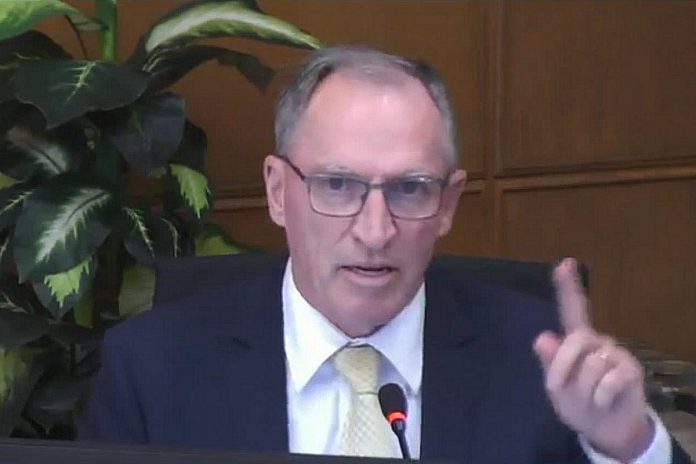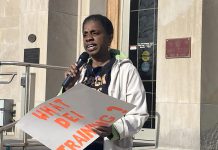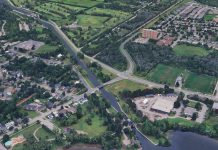
Despite three councillors changing their mind, Peterborough city council approved a plan to assume responsibility for economic development and tourism services on Monday night (June 24), in the last regular council meeting until August.
During the meeting, council also passed a motion to encourage the federal and provincial governments to increase support for college boards.
While council debated both of these items, other items that were previously endorsed by council at its general committee meeting the previous Monday were approved without further discussion, including transferring responsibility for water operations and the Riverview Park & Zoo from Peterborough Utilities Commission to the city, and a new licensing system for taxi, limousine, and ride share services following the transfer of responsibility for these services from the Peterborough police to the city.
At Monday’s meeting, council discussed the plan presented by city staff to bring economic development and tourism services in-house for the first time in over 25 years, with Peterborough & the Kawarthas Economic Development (PKED) dissolving at the end of the year.
PKED announced it would be dissolving after the city — which provides most of the core funding to the non-profit economic development organization — decided it would not renew its funding agreement, leaving the organization with insufficient revenue to continue operating after December 31.
While councillors had voted unanimously to support the plan at the June 17 general committee meeting, three councillors — Joy Lachica, Alex Bierk, and Dave Haacke — changed their mind and their vote about the plan.
Haacke reiterated comments he made at general committee that the lack of serviceable land in a desirable location is at the root of Peterborough’s inability to attract large employers to the city, not the efforts of PKED.
“To (PKED CEO) Rhonda Keenan and their team, I think they have taken the brunt of something that I don’t think that they deserve,” said Haacke. “Last week, I didn’t agree that we were doing the right thing but I supported the outcome. This week I am going to change that. I am going to vote against the motion to move it in-house at this time because, as I said, I think just moving from A to B doesn’t add a lot to the conversation at this point. And I hope I am proven wrong.”
For his part, Bierk said he could not support the plan because he believes it sets the city along a “very strict and rigid path” — including naming the city’s tourism branding as ‘Experience Peterborough’ — which should instead be determined by the staff the city hires to deliver economic development and tourism services.
“I don’t find anything special about and necessarily groundbreaking about how this is being presented, even to the point where other municipalities have a plan like this, that looks extremely similar,” Bierk noted. “And when I say that, I think of Experience Brampton. It’s almost a carbon copy of what we’re being presented here.”
Lachica also said she was changing her original vote after having further conversations and upon more reflection. She also noted that she and Bierk toured PKED and she was “really impressed by the expertise and all that they have offered.”
“I feel torn about our loss of PKED, and I’m grateful and appreciate for the wake that they leave the City of Peterborough,” Lachica said. “We do need to look and hard with consultants on what is the branding that we need, what is the scope and array of expertise that we need to hire to make this template effective and efficient, because that is the purpose of bringing it in-house in the first place.”
The remaining councillors all indicated they would vote in support of the plan, including councillor Duguay.
“I might remind my colleagues that the County of Peterborough has also agreed to break away from economic development (PKED), and I don’t hear criticism of that entity as far as their intentions,” he said.
It should be noted that the county’s decision to take economic development in-house was not made independently of the city. The county’s decision to not renew its agreement with PKED only followed the city’s decision not to do so, as the county would not be able to provide sufficient funding to allow PKED to continue operations without the city also providing funding. The city’s core funding share for PKED in 2024 is $1,015,112, while the county’s core funding share is $790,038.
For her part, councillor Parnell — who was not present at the June 17 general committee meeting although she watched it online — acknowledged the issue of the lack of serviceable land was the main challenge for PKED in bringing large employers to the city.
“I do also need to speak up for (PKED CEO) Rhonda Keenan and her team,” Parnell said. “As part of the (memorandum of understanding between PKED and the city), she appeared before this council in these chambers, not just this term of council but previous, every time giving us solid data — which I know Mayor, you appreciate data — as to how many contacts they had, how much work they had done within tourism, how much work they had done to support local businesses that exist, how many new businesses they were helping to develop as well.”
“Of course, they were always looking for that big catch — the big business to attract to Peterborough to bring all the big jobs. And every single time, why haven’t we done that? And it was because we did not have the large piece of serviced land, so (Rhonda Keenan) couldn’t really bring that to us because we didn’t provide the facilities, the infrastructure, to accommodate that. That was a huge hang-up for their success in that area, but they certainly did very well in many other areas.”
Parnell also said the city will need the help of Peterborough-Kawartha MPP Dave Smith and will need to work with partners such as Trent University, pointing to the city’s $12-million investment in Cleantech Commons at the university, which has yet to attract a single research company to build on that land, partly because of its location.
Parnell added that she was supporting the city’s plan, earlier implying that it is too late to reverse course, “but we need to get some results out of this.”
Councillors voted 8-3 to support the plan to move economic development and tourism in-house, with councillors Lachica, Bierk, and Haacke voting against it.
In relation to a motion from councillor Lachica about Fleming College’s decision to eliminate 29 programs, council began the meeting by hearing from four registered delegations that expressed concerns about the impact of the college’s decision.
Lachica’s motion calls for the city to encourage the federal and provincial governments to increase support to college boards, “by establishing metrics and direction around maintaining courses where cohorts offer a return on investment in the local economy, in small business and in filling jobs vital to a college’s immediate region.”
One of the delegations was Jamie Malloy, owner and president of Fraserville-based Iron Equipment, one of southern Ontario’s largest heavy equipment repair and service providers. Malloy, who himself graduated from Fleming College’s heavy equipment maintenance course in 1999, expressed his concern about the college’s decision to discontinue its Heavy Equipment Techniques and Generator Service Technician programs.
“From the perspective of someone who’s trying to cut costs, I can understand where the decision to cut this program may have come from,” Malloy said. “However, the return on investment to the community is something that the board (of Fleming College) did not consider, nor was the board provided with appropriate figures that demonstrate this information.”
On May 21, Malloy made the same presentation to Kawartha Lakes city council, which at that meeting passed a resolution similar to Lachica’s.
Councillors also heard from Mark Ryckman, manager of policy at the Ontario Federation of Anglers and Hunters, who expressed concerns about Fleming College’s decision to eliminate the Conservation and Environmental Law Enforcement and Fish and Wildlife Technology programs.
Nigel Lister, regional manager of market development at Cambium Inc., also spoke before council, expressing concerns about the impact of Fleming College’s decision to eliminate its environmental programs on the skilled workers that would be available to the consulting and engineering company, which specializes in the environment.
Councillors also heard from two Fleming College graduates who expressed their concerns that many of the programs eliminated by Fleming College were pathway programs to university, specifically mentioning the General Arts and Science – University Transfer Program, which the students stated has also been eliminated although it is not on the list of 29 programs.
Later in the meeting, council debated Lachica’s motion. Councillors Gary Baldwin, Duguay, and Parnell all spoke about their belief that Lachica’s motion was not within council’s jurisdiction and was questioning the internal decisions of Fleming College’s board, with Parnell noting the board did not request council’s support in advocating to the federal and provincial governments.
In response, Lachica outlined the economic impact of Fleming College on the local community and said city council’s role is to show leadership in issues that affect the local community.
“If that is not my responsibility as a municipal counsellor, I don’t know what it,” she said. “The economic health, well-bring, and life of this community is my responsibility, and one of the primary reasons I was elected … We don’t have to ask permission to advocate for our community.”
Councillor Matt Crowley (who voted against the motion at general committee) indicated he would support the motion after having several conversations with different people. Along with Lachica, Bierk, Riel, and Haacke spoke in support of the motion.
“I did support this last week and I continue to support it, particularly after hearing tonight from a lot of the local people, some of which I know,” Haacke said. “I don’t understand why we’ve spent a half an hour on this, really, when I think it’s that simple.”
In the end, Lachica’s motion passed 7-4, with Mayor Jeff Leal and councillors Baldwin, Duguay, and Parnell voting against it.


























